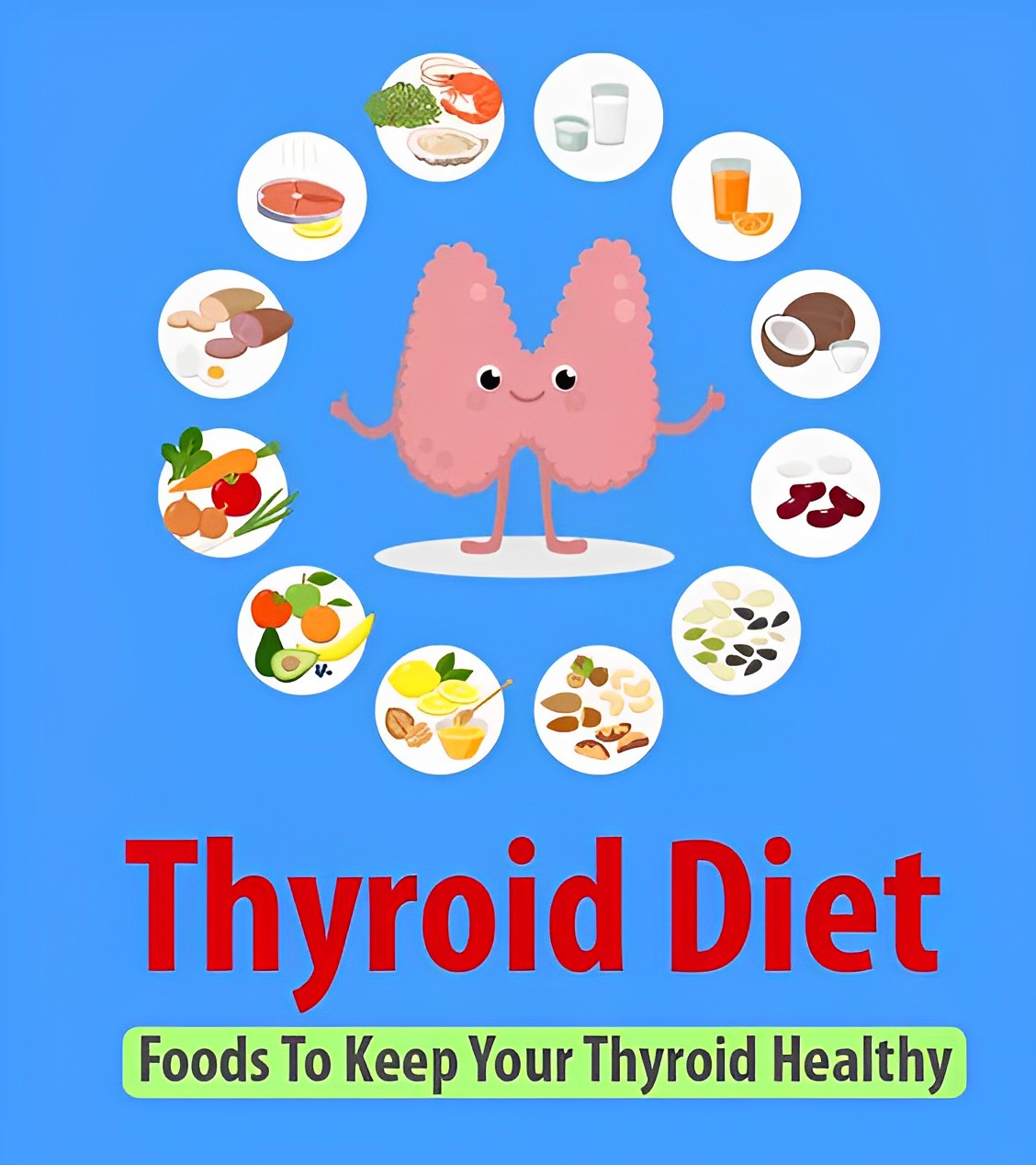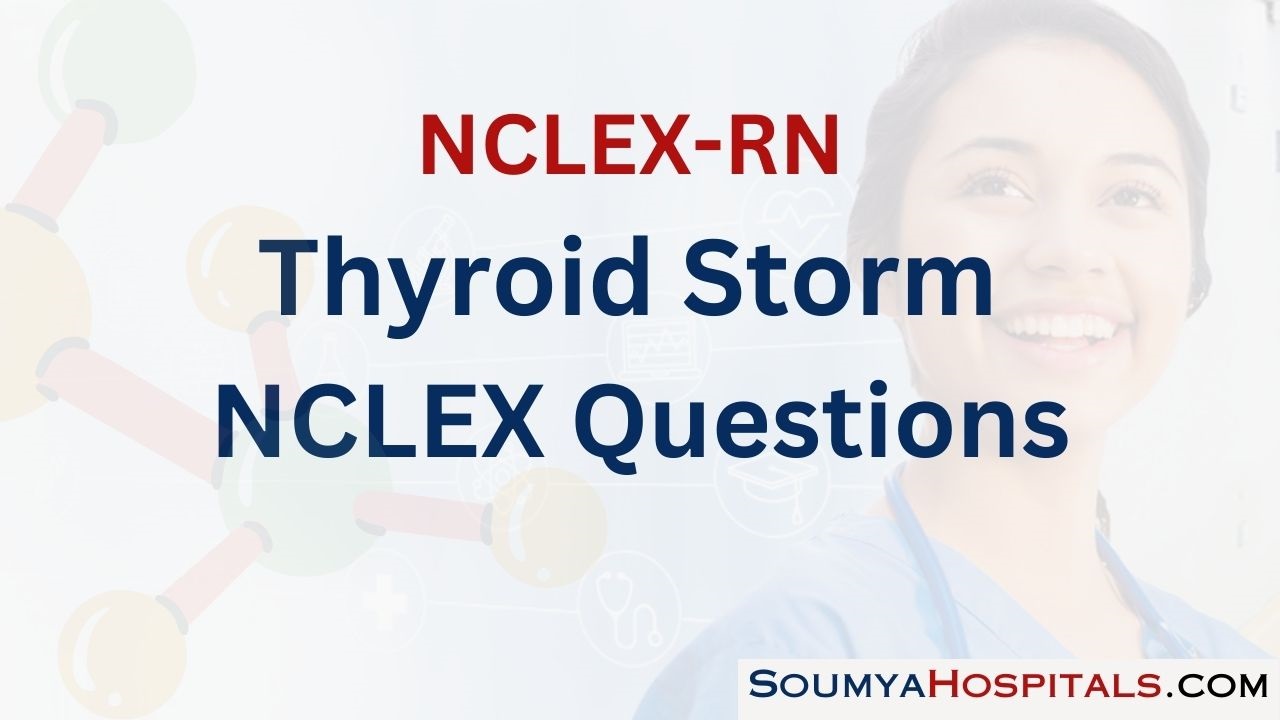NCLEX Prep Questions focus on client care, health promotion, disease prevention, and the nursing process.
NCLEX Thyroid Storm Questions - NCLEX Questions on Thyroid Storm
Thyroid Storm NCLEX Practice Questions
Question 1.
Mrs. Agrima is a 67-year-old woman who has been diagnosed with hyperthyroidism for the past year. She has been taking antithyroid medication to manage her condition, but has recently stopped taking it due to side effects. Mrs. Agrima has developed symptoms of thyroid storm, including fever, tachycardia, hypertension, and confusion. She is also experiencing vomiting and agitation.
What is the most appropriate nursing management procedure for Mrs. Agrima's thyroid storm?
(a) Administer antipyretics to manage the fever
(b) Administer anti-thyroid drugs to manage the hyperthyroidism
(c) Administer beta blockers to manage the tachycardia and hypertension
(d) Administer glucocorticoids to manage the agitation and confusion
Answer:
(c) Administer beta blockers to manage the tachycardia and hypertension
Explanation:
Thyroid storm is a life-threatening condition that requires immediate medical attention. The most common symptoms of thyroid storm include fever, tachycardia, hypertension, and confusion. Beta blockers are a recommended treatment for tachycardia and hypertension in patients with thyroid storm, as they can help to lower the heart rate and blood pressure.
Antipyretics can be used to manage fever, antithyroid drugs can be used to manage hyperthyroidism, and glucocorticoids can be used to manage agitation and confusion. However, in this case, the most appropriate treatment for Mrs. Agrima's tachycardia and hypertension is beta blockers.
Rationale:
Beta blockers are a recommended treatment for tachycardia and hypertension in patients with thyroid storm. Antipyretics can be used to manage fever, antithyroid drugs can be used to manage hyperthyroidism, and glucocorticoids can be used to manage agitation and confusion. However, in this case, the most appropriate treatment for Mrs. Agrima's tachycardia and hypertension is beta blockers.
Question 2.
A 45-year-old woman with a history of hyperthyroidism presents to the emergency department with a fever of 101°F, tachycardia, hypertension, and confusion. She reports feeling agitated and restless and has been vomiting frequently. Upon examination, the healthcare provider suspects the patient is experiencing a thyroid storm.
What is the first step in managing a patient with thyroid storm?
(a) Administering antipyretics to manage the fever
(b) Checking the patient's vital signs
(c) Ensuring the patient's airways are clear
(d) Prescribing antithyroid drugs, beta blockers, or glucocorticoids
Answer:
(c) Ensuring the patient's airways are clear
Explanation:
Option A, administering antipyretics to manage the fever, and option D, prescribing antithyroid drugs, beta blockers, or glucocorticoids, may be appropriate steps in managing the patient's condition, but they are not the first priority. Option B, checking the patient's vital signs, is important, but it should be done after the airways have been secured. Ensuring the patient's airways are clear is the most important step in this situation, as it is a life-threatening emergency.
Rationale:
Ensuring the patient's airways are clear is the first step in managing a patient with thyroid storm. This is a life-threatening emergency, and the priority should be to stabilize the patient and ensure their safety. Checking the patient's vital signs and administering antipyretics or antithyroid drugs can be done after the airways have been secured.
Question 3.
A 25-year-old woman presents to the emergency department with a fever of 104°F, tachycardia, hypertension, and confusion. She has a history of untreated hyperthyroidism and has recently undergone thyroid surgery. Upon further assessment, the patient is found to be experiencing thyroid storm.
What is the first step in the management of a patient with thyroid storm?
(a) Administer antipyretics
(b) Administer antithyroid drugs
(c) Check vital signs
(d) Assess airway
Answer:
To solve this question, it is important to consider the priorities of management for a patient with thyroid storm, which is a life- threatening condition. The first priority in the management of any critically ill patient is to ensure that the patient has a patent airway and is able to breathe properly. Therefore, option (d) is the most appropriate answer.
Explanation:
While administering antipyretics and antithyroid drugs may be important in the management of thyroid storm, they are not the first priority. The patient's vital signs should also be checked, but this should be done after the airway has been assessed and any necessary interventions have been implemented to support the patient's breathing. Ensuring a patent airway is the first and most important step in the management of a patient with thyroid storm.

Question 4.
A 3 5-year-old woman is brought to the emergency department with a high fever, rapid heart rate, and hypertension. She is agitated and confused, and has a history of undiagnosed hyperthyroidism. The physician suspects that the patient is experiencing a thyroid storm and orders a series of medications to be administered.
What is the possible treatment for thyroid storm?
(a) Antipyretics
(b) Antithyroid drugs
(c) Beta blockers
(d) Glucocorticoids
Answer:
(b) Antithyroid drugs To solve this question, it is important to remember the key symptoms and management procedures for thyroid storm. The patient in this case is experiencing a high fever, rapid heart rate, and hypertension, and the physician has ordered a series of medications to be administered. Therefore, the correct answer will be one of the medications in the treatment options.
Explanation:
Antithyroid drugs work by inhibiting the production of thyroid hormones by the thyroid gland. These medications can be administered orally or intravenously, and are effective in reducing the symptoms of hyperthyroidism, including tachycardia, hypertension, and fever.
Beta blockers and glucocorticoids can also be used to help manage the symptoms of thyroid storm, but they are not the possible treatment. Antipyretics may be used to help reduce fever, but they are not the possible treatment for thyroid storm.
Rationale:
Antithyroid drugs are the possible treatment for thyroid storm, as they work to reduce the production of thyroid hormones and help to bring the patient's hyperthyroidism under control.
Also Read:
